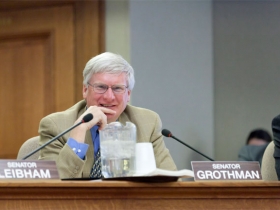How to Kill a Democracy
Glenn Grothman’s proposal would shield 96% of all political donations, ending transparency in campaigns.
I first met state Sen. Glenn Grothman (R-West Bend) in 1997 after I’d done a rating of state legislators for Milwaukee Magazine and he was picked by many as the “Most Conservative” legislator. Then an assemblyman, Grothman was nicknamed “spooky” by some women legislators of both parties, I wrote, because of his “aberrant” views.
After the story was published, Grothman boldly stopped by the magazine office and introduced himself. He didn’t seem spooky at all, and I enjoyed our chat. Over the years I got to like him, though we probably disagree on 90 percent of the issues. For reporters, he’s helpful because he’s bluntly outspoken and provides good copy. He also offers a frank, unvarnished view of the capitol that can be informative. Finally, he stands out as someone who is philosophically consistent, which is not that common. He’s suspicious of all government subsidies, including for business and was something of a hero in opposing the grossly wasteful CAPCO program, allegedly a venture capital program that in reality handed out huge subsidies to select insiders who created few jobs.
Grothman was a proponent of payday loan reform and supported Democratic legislation that capped interest rates on these short-term lenders, arguing they gouged poor people. He also was the rare Republican who opposed ending the residency requirement, arguing it could “devastating” to some of Milwaukee’s best neighborhoods.
So I wanted to get his take on his proposed legislation that would make campaign donations less transparent: Under current law, donors must disclose their principal employer if they donate more than $100 to candidates in any one year. His proposal would raise that threshold to $500.
The legislation seems drastic. The Wisconsin Democracy Campaign, the non-profit that tracks all campaign donations, estimates that since 1996, 96 percent of all donations have been for $500 or less, meaning those contributors would not have to disclose their occupation. But this is the only way to determine their financial interest, revealing ties to a business or union or lobbying group that may want some bill passed or contract awarded.
Grothman also says the law is burdensome. “If you have a volunteer (campaign) treasurer, it’s a pain in the butt to list every person’s occupation. Sometimes my treasurer looks forever to find some occupations.”
But those aren’t really his main arguments. Grothman admits he was never bothered by the disclosure requirement until the recall controversy arose and a boycott was organized by firefighters, police and teachers unions against businesses, such as M&I Bank, whose employees had contributed to Walker’s campaign. These kind of boycotts, he says, basically put businesses “at risk” for participating in a democracy.
“What those unions did ought to be highlighted. It was horrible.” Grothman says he introduced the bill “hoping the conservative press — which is basically talk radio — would pick up on it and remind people what went on.”
Yet he adds that he is not just trying to dramatize the issue, but hopes to get the legislation passed.
His only concession: he’d consider cutting the threshold to $250. In fact, he previously proposed such a threshold and the bill didn’t pass. “I first introduced this years ago, but it was implied (by Republican legislative leaders) that this could be passed later, after the recall.”
Grothman points to the impact of having every teacher boycott a business, but now that unions have been crushed by Act 10, the state teachers union is a shadow of itself and unlikely to have the resources to launch such a campaign. Even if it could, Grothman’s “cure” seems drastically worse than the alleged disease.
For starters, the $500 threshold would exclude all Assembly contributions and all aldermanic contributions in the state since the maximum donations to those offices are $500 or less. It would also exclude the vast majority of contributions to Milwaukee County Supervisors, since the threshold for that is $543.
For Milwaukee, it would mean almost all contributors would be shielded from disclosure of their possible financial interests in governmental policies. Both Mayor Tom Barrett and County Executive Chris Abele oppose the measure.
Says Abele: “It’s unclear what the problem is that this would fix. My bias, especially in elections, is transparency. The public deserves to know more, not less information about where campaign funding is coming from.”
Says Barrett: “Wisconsin has a solid tradition of making information available that voters might find useful. It’s not a significant hardship to share basic information – such as the company a donor works for – when campaigns are likely to have it readily available in their files.”
Conservative blogger and Brookfield Republican Cindy Kilkenny told the Journal Sentinel the bill would make it impossible to check whether a developer is trying to influence a local election. “I live on those databases,” she said.
Even at the $250 threshold, this would mean 84 percent of all donors to state campaigns would not have to disclose their employer, notes Mike McCabe, executive director of the Wisconsin Democracy Campaign. This would make it far harder to trace the financial connections of those supporting particular bills, and to show how that influences particular legislators.
It would also make it harder to prosecute political corruption, McCabe contends. He points to the cases against Wisconsin and Southern Railroad CEO William Gardner and Kenosha businessman Dennis Troha, who were both convicted of money laundering donations. “In both cases,” McCabe says, “law enforcement authorities contacted us to ask for our assistance in identifying employees of their respective companies who had made donations to Wisconsin candidates for office.” That would have been far more difficult if every donation below the $500 threshold was shielded from disclosure.
Similarly, Kevin Kennedy, head of the Government Accountability Board, told the Journal Sentinel that the GAB has used the employer information from donors to successfully investigate wealthy contributors who were violating state campaign donation limits by funneling contributions through their employees
Grothman says his goal is to protect businesses, but when you consider the huge growth in campaign donations in the last 20 years, there’s little evidence that businesses are dissuaded from giving to candidates.
Even Grothman seems to concede the so-called “dark money” spent anonymously by third party groups is a problem. “I’d like to know where the independent expenditures are coming from,” he says.
So why move in the direction of turning direct campaign contributions into dark money? We don’t need less transparency of campaign donations, we need more. To use Grothman’s phrase, this proposal he’s concocted is just horrible.
Murphy's Law
-
Is Legislature Biased Against Working Class?
 Apr 4th, 2024 by Bruce Murphy
Apr 4th, 2024 by Bruce Murphy
-
Associated Press Will Decline in Wisconsin
 Mar 27th, 2024 by Bruce Murphy
Mar 27th, 2024 by Bruce Murphy
-
City Attorney Race Is Vitally Important
 Mar 25th, 2024 by Bruce Murphy
Mar 25th, 2024 by Bruce Murphy


















This is not either a conservative or liberal issue. You could imagine this sum of money falling under some kind of privacy issue. In an democracy we do not publish how everyone voted. Is this really that different?
Stacy, a private vote cannot corrupt a politician; a pile of money can (and will).
Grothman isn’t trying to protect the privacy of INDIVIDUALS; under his bill, contributors’ names, addresses and amounts would still be published.
Instead, Grothman is only trying to protect the privacy of EMPLOYERS. Right now, if you contribute more than $100, your employer’s name is listed right along side yours. The only thing Grothman proposes hiding is your employer’s name.
If Grothman were truly concerned about privacy, Wisconsin has far worse privacy problems:
– Publishing the names of people signing recall petitions (especially when used to deny credit, employment, or appointment to public positions)
– Publishing the names and income tax payments for individuals (I think Wisconsin is the only state that does this)
Disclosing employer names is essential to combat “bundling”–when, for example, an employer pressures 200 executives to each contribute the individual limit, say $500 (often with the implied promise that the money will be returned via future pay increases or bonuses). The $100,000 in checks are collected (“bundled”) and personally presented en massé to the candidate by the CEO. This is entirely legal but sure seems like a (over-the-limit) $100,000 corporate contribution to me. The only way to keep tabs on this is by disclosing the employer of each large contributor.
The reason there is a $100 threshold at all is for administrative convenience, not for privacy. It is a hassle for campaign committees to chase after donors to get employer information, and the $100 minimum is designed to reduce that burden. But since the limit was set in 1973, the widespread use of computers has made it much easier to comply with the law.
I understand and respect some people’s desire to keep their contributions out of the public eye, and there ought to be a way to do that, PROVIDED that those contributions are kept secret from the candidate as well.
One way to do this would be to let an independent agency (like perhaps the GAB) accept anonymous money designated for specific candidates. The money would be forwarded to the designated candidate without naming the contributor. The GAB would record the donor’s name but not make it public–it would only be used for auditing purposes. It would be a felony to disclose this donor information to campaigns or candidates.
Under this proposal, people who wanted to give money publicly could still do so (giving directly to the candidate), but their information–including their employer–would, and should, remain public.
But we did publish everyone who signed the recall, which has turned into a weapon in local elections. We also publish who votes and when, which is a weapon in get-out-the-vote campaigns. But the issue here doesn’t appear to be the disclosure of names, but the disclosure of employers. I might not mind if my name is attached to a campaign, but if they have to spell out that I work for MPS but I gave to Walker’s campaign (I don’t, I didn’t), that could cause me some problems. Or what about the companies that threatened to fire people if President Obama was reelected in 2012. I might not donate to the campaign if I had to specifically publish that I work for one of those places (again, I don’t, I didn’t). And they’d have an easy time sorting the list by their company name and learning who to fire first (which specifically is illegal, but really easy to hide).
A few months back Bruce railed on and on about the Concealed Carry law but now we have 200,000 CC people that have had no major problems and saved a lot of people. Actually in Wisconsin 200,000 armed guys is a small number. During hunting time, opening day we probably have a million or so in the filed. And contrary to leftist opinion they do not run around killing people with their semiauto guns but they protect everyone from the thugs that the Left does not put in jail.
Funny to watch a loon come in and talk about something completely off topic as they are so in love with their own voice they can’t help it.
Dohnal, have you forgotten Oak Creek already? It’s only been a year! I’d guess that probably had more in common with you than not, and he DID “run around killing people with their semiauto guns.”